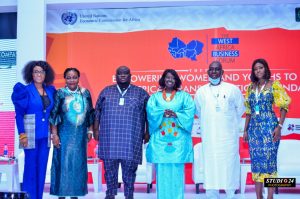ECA,350 partners push for economic empowerment of African women, youths

An avid reader, analytical writer and consistent content creator with several enlightening articles and reports. He is currently a journalist , Commodities, Agriculture and Technology at business a.m. newspaper. Email: amugedavido@gmail.com. Tel: +234 706 930 4947
September 23, 2021792 views0 comments
The United Nations Economic Commission for Africa (ECA), through its sub regional Office for West Africa (SRO-WA), in collaboration with Compass Global Consulting, recently concluded a 3-day hybrid regional business forum
 in Lagos aimed at creating major mind shifts to aid women and youth advancement in Africa and the world at large.
in Lagos aimed at creating major mind shifts to aid women and youth advancement in Africa and the world at large.
 The event, themed “Empowering Women Youths to Spur Africa’s Transformation Agenda” and supported by over 350 coalition partners, witnessed an immense gathering of high-level delegates,business leaders, and guests, particularly women and youths,representing various business organisations and SMEs across the West African region.
The event, themed “Empowering Women Youths to Spur Africa’s Transformation Agenda” and supported by over 350 coalition partners, witnessed an immense gathering of high-level delegates,business leaders, and guests, particularly women and youths,representing various business organisations and SMEs across the West African region.
Delivering the opening remark,Vera Songwe, United Nations under-secretary-general, and ECA executive secretary,explained that the purpose of the forum was to bring together West African woman to leverage the knowledge,innovations, and vibrancy they possess and ensure they can take their businesses one notch higher to the global sub-region, taking advantage of markets that are further beyond in the East and the West.
Read Also:
- SIFAX Group partners WIMAfrica to champion gender equality in Maritime Industry
- Glovo creates pathway for future female tech leaders with Women in Tech bootcamp
- Nigerian airlines not among African carriers with world’s 3 major alliances
- NAICOM urges expansion of Islamic finance to tackle economic challenges
- African contractors secure $370m deals at Afreximbank’s Lagos workshop
The ECA executive secretary further stated that the African Continental Free Trade Agreement (AfCFTA) stands to grow Africa’s GDP by an additional one trillion dollars by unlocking borders, building value chains, and ensuring African women work together to create the supply chain for textile, fashion, agro-industry and essentially grow the value of their products. She added that AfCFTA also presented opportunities for women to expand their businesses beyond their countries into sub-regional and continental markets.
 In her remarks, Zainab Ahmed, minister of finance,during her session, emphasised the need for society to empower youth and women through inclusive development, adding that it remains a core element of both the African Union Agenda 2063 and the United Nations economic sustainable development goal agenda.
In her remarks, Zainab Ahmed, minister of finance,during her session, emphasised the need for society to empower youth and women through inclusive development, adding that it remains a core element of both the African Union Agenda 2063 and the United Nations economic sustainable development goal agenda.
Ahmed also disclosed that the Nigerian government is set to leverage its national strategy towards creating an industrial digital economy aimed at fostering a sustainable and inclusive economic development in Nigeria and across the African continent.
“This business forum updates the linkage needed to raise and nurture women and youths ,share business ideas and leverage on critical digital infrastructure to leverage and maximise investing opportunities and reshape the future of the African women and youths,” she added.
On his part,Tei Konzi, commissioner, Trade, Customs and Free Movement, ECOWAS Commission, reiterated that the AfCFTA is aimed at creating a single continental market for goods and services for free movement of business, people and investments.
Konzi encouraged women and youths in West Africa to enhance their participation in trade, so as to promote the success of the agreement, and also advocate for inclusive policies at the national and regional level through business associations.
Reinstating ECOWAS’ commitment to women and youth empowerment, the commissioner said that his organization will always be mindful of the roles women and youths play in economic development.
Speaking on the topic “Setting the context: why empowering women and the youth matters to Africa’s structural transformation agenda.”, Ngone Diop, sub-regional director, West Africa Office, UNECA, noted that female entrepreneurs make significant contributions to economic growth and to poverty reduction in Africa, with contributions of between $250 billion dollars to $300 billion dollars, while their contribution to Africa’s economic growth was about 13 percent of the continent’s gross domestic product (GDP).
Diop urged African leaders to support job creation and leadership opportunities for women and youths, and also ensure training and access to digital technology. She further stressed that enabling African women and youths would advance their prospects for all and build more resilient economies, to improve the quality of life for their entire populations.
Also speaking at the event, Ifeyinwa Ugochukwu,the CEO of Tony Elumelu Foundation, emphasised the Foundation’s commitment to foster gender inclusion, through the gender mix of its workforce, mentors, and TEF alumni.
Commenting on the Tony Elumelu Foundation’s effort towards socio-economic empowerment of African women and youths, she said, “When we first started the programme, our goal was to achieve 50% women’s participation, and we began at 25%. Today, we’re at 40%. This year, the Foundation will fund over 3,000 women owned businesses across the continent.”
During the Question & Answer session with the audience, Vanessa Phalla, director of the International Labour Office (ILO), Abuja, explained some ways to create and maintain the potential of Africa’s young labor force.
Phalla noted that while a young and growing labor force is a potential resource, decent job opportunities need to be created for new labour market entrants.
